
Politics and anti-realism in athenian old comedy: the art of the impossible
Ruffell, Ian
The comic drama of the late fifth and early fourth century BCE was typified by the combination of absurd and fantastic plots, often dealing with social and political issues of the day. This study puts these elements centre-stage andargues that it was through them that the comedy of the period made its political interventions. The collision of politics and claims of political intervention with the fantastic, absurd, and impossible is characteristic of the Athenian comic drama of the late fifth and early fourth century BCE, and has proved persistently problematic for critics. This book sets the impossible centre-stage and argues that comic impossibility should not be ignored in political readings or, conversely, used as a reason for excluding comedy from political interventions, but that anti-realism andthe absurd are precisely the mechanisms through which this sort of comedy hadpolitical and social effects, manipulated its audience, and maintained its position in an environment of many competing political claims. Drawing on a variety of theoretical paradigms, from semiotics and humour theorythrough to ancient literary criticism, this book seeks to articulate a model of comic narrative and argument that can be applied equally both to the impossible worlds of Old Comedy and those of related forms of comedy in other traditions. This model emphasizes complex and provisional conceptual development over the linear and inflexible models of traditional models of comic narrative, and makes the joke and routine the base elements of comic plot. Pervasive comicself-reflexivity('metatheatre') is presented as a special case of comic impossibility and onethat intensifies and consolidates audience response. The on-going dialogue with comic rivals and performance forms provides both foundational matter for comic worlds and a competitive dimension to those worlds, an argument about the bestkind of comic world and a demonstration that comic anti-realism has the political and conceptual measure of its more widely-recognized and supposedly realist rivals. INDICE: 1 Tripping over the light fantastic Plato s comedy store The art of the impossible 2 Possible worlds and comic fictions Possible, impossible andfictional worlds Illusion, fiction and make-believe Between worlds: identification, mapping and reference Logic, cognition and emotion 3 On eating cake: joke semiotics Is laughter central to komoidia? Metaphors and other jokes Towards a theory of the joke Summary 4 Comic motivation: jokes and episodic plot Comic plot and narrative Jokes in narrative A dog s dinner: complex routines in Wasps Episodic plot 5 Comic networks: story and argument Comic structure World,episode and argument: Akharnians Jokes, concepts and comic meaning: Knights How did we learn today? 6 Entering the metaverse: comic self-reference Disruptive theory Thinking the unthinkable The limits of self-reference Chorus and consistency The comic multiplier Strangely significant worlds 7 The role of the audience: ideology, identity and intensity Constructing the audience From worlds to stage: mapping audiences Dionysiac worlds/festive worlds Anti-realism, Metatheatre, and fantasy politics 8 Flights of fancy: tragic myth and comic logos Parody, intertextuality and anti-realism Tragic and comic possibilities Parody, anti-realism and postmodernist poetics 9 A total write-off: continuity andcompetition Comic intertextuality: iterability and innovation The comic multiverse: world, story and plot Comic populations: satire and stereotype What s so funny? About Peace and comic understanding Comic competition 10 Conclusion: politics, ideology and Old Comedy Index locorum General index
- ISBN: 978-0-19-958721-6
- Editorial: Oxford University
- Encuadernacion: Cartoné
- Páginas: 512
- Fecha Publicación: 15/12/2011
- Nº Volúmenes: 1
- Idioma: Inglés
